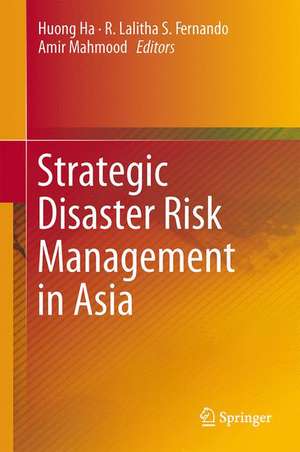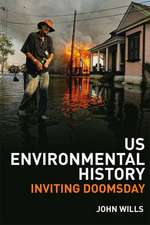Strategic Disaster Risk Management in Asia
Editat de Huong Ha, R. Lalitha S. Fernando, Amir Mahmooden Limba Engleză Hardback – 10 iun 2015
Against this backdrop, the book examines disaster management issues such as disaster preparedness, post-disaster reconstruction, peace, development and corruption. The views of different groups of stakeholders are incorporated in the discussion to ensure a comprehensive analysis of and findings on the governance process, as well as best practices in pre- and post-disaster management. The book also includes chapters focusing on aspects often overlooked in the context of disaster management, such as the need to invest in public education to improve public awareness, and approaches to supporting the disabled, the vulnerable and the elderly from disaster risks. In closing, the book presents research on disaster management methods employed by different countries in the Asian region.
Acknowledgement: The editors acknowledge the role of the Network of Asia Pacific Schools and Institutes of Public Administration and Governance (NAPSIPAG), which is the largest governance research network in the Asia Pacific region,in bringing out this book. NAPSIPAG has been regularly organizing international meetings of administrators, academia and non-state bodies to provide a forum to the regional scholars to deliberate with the international governance experts. It has also helped the international policy organizations to have a better understanding about the region through a local lens of Asiatic anthropology, ethnography and culture of administration.
| Toate formatele și edițiile | Preț | Express |
|---|---|---|
| Paperback (1) | 638.76 lei 6-8 săpt. | |
| Springer India – 23 oct 2016 | 638.76 lei 6-8 săpt. | |
| Hardback (1) | 644.95 lei 6-8 săpt. | |
| Springer India – 10 iun 2015 | 644.95 lei 6-8 săpt. |
Preț: 644.95 lei
Preț vechi: 758.77 lei
-15% Nou
Puncte Express: 967
Preț estimativ în valută:
123.45€ • 134.14$ • 103.77£
123.45€ • 134.14$ • 103.77£
Carte tipărită la comandă
Livrare economică 21 aprilie-05 mai
Preluare comenzi: 021 569.72.76
Specificații
ISBN-13: 9788132223726
ISBN-10: 8132223721
Pagini: 180
Ilustrații: XXXV, 226 p. 4 illus.
Dimensiuni: 155 x 235 x 20 mm
Greutate: 0.54 kg
Ediția:2015
Editura: Springer India
Colecția Springer
Locul publicării:New Delhi, India
ISBN-10: 8132223721
Pagini: 180
Ilustrații: XXXV, 226 p. 4 illus.
Dimensiuni: 155 x 235 x 20 mm
Greutate: 0.54 kg
Ediția:2015
Editura: Springer India
Colecția Springer
Locul publicării:New Delhi, India
Public țintă
ResearchCuprins
Chapter 1. Strategic Disaster Management in Asia: An Introduction.- Chapter 2. Diaster Management in the Five Year Plans of Bangladesh: An Assessment.- Chapter 3. Politico-Administrative Response to the Diastrous Impact of Hydro Power on Nature and People: A Case Study.- Chapter 4. Disability in Humanitarian Emergencies in India: Towards an Inclusive Approach.- Chapter 5. Disaster Management and Role of Armed Forces: Critical Analysis of Reactive Disaster Management in India.- Chapter 6. An Analysis of the Effectiveness of Implementing Public Awareness, Education and Training Programs as a Risk Reduction Strategy in Disaster Management in Sri Lanka.- Chapter 7. Effectiveness of Administrative Preparedness: A Case Study on Flooding Conditions in Ambangamuwa Korale Division of Nuwara Eliya District in Sri Lanka.- Chapter 8. Mitigating Disasters through Community Involvement and Righteous Practices in Himalayan Region of Uttarakhand, India.- Chapter 9. Administrative Planning and Political Response to a Post-Disaster Reconstruction: A Study of Aila (Cyclone) Devastated Gosaba Block in West Bengal (India).- Chapter 10. Missing Link between State and Community: Post Tsunami Reconstruction and Rehabilitation of Alappad Panchayat, Kerala, India.- Chapter 11. Ridge to Reef Approach to Development.- Chapter 12. Humanitarian Logistics in Asia: A Missing Link in Disaster Management and Practice.- Chapter 13. Disaster Management and Corruption: Issues, Interventions and the way ahead.- Chapter 14. Disaster Management in Border Sensitive Area: Case Study of Amritsar District.- Chapter 15. Disaster Management in Asia: Lessons Learned and Policy Implications.
Notă biografică
Dr. Huong Ha is currently affiliated with UON Singapore and University of Newcastle, Australia. She holds a PhD from Monash University, Australia and a Master’s degree from Lee Kuan Yew School of Public Policy, National University of Singapore (NUS). She was a recipient of a PhD scholarship (Monash University), Temasek scholarship (NUS), and a scholarship awarded by the United Nations University/International Leadership Academy, many other scholarships, professional and academic awards, and several research related grants. She was a subject of biography in Who’s Who of the World, 1999 – 2000; Who’s Who in Asia Pacific, 1999 - 2000 and Who’s Who in Vietnam, 1998 – 1999 by Barons Who’s Who, USA; and was invited to be included in Who’s Who of Asia/Pacific, Vol. IV, 2002 by Rifacimento International, India. She has authored or co-edited three books: (i) Ha, Huong (2014). Change Management for Sustainability. USA: Business Expert Press, (ii) Ha, Huong (2014). Land and Disaster Management Strategies in Asia. H. Ha (Ed.), Springer; and (iii) Ha, Huong & Dhakal, T. N. (Eds.) (2013). Governance Approaches to Mitigation of and Adaptation to Climate Change in Asia. UK: Palgrave Macmillan; and has produced about 75 journal articles, book chapters, conference papers and articles in encyclopedias. She is an invited member of (i) the international editorial boards of many international journals/book projects in Romania, the Philippines, Singapore, the USA and the UK; (ii) the scientific/technical committees of several international conferences in Albania, Europe, the USA; and (iii) international advisory board of many professional associations. She is also a reviewer of many high-impact international journals andinternational conferences (e.g. International Journal of Contemporary Hospitality Management, Thunderbird International Business Review, Journal of Management and Organisation, Academy of Management (conferences), International Journal of Environment and Sustainable Development, Australian and New Zealand Academy of Management conferences, International Journal of Consumer Studies, etc.).
Dr. R. Lalitha S. Fernando serves as a Professor in Public Administration, Faculty of Management Studies and Commerce of the University of Sri Jayewardenepura in Sri Lanka. She was awarded the prestigious Commonwealth Academic (internal) Scholarship to pursue Postgraduate Diploma in Development Studies leading to Masters in Development Administration and Management at the University of Manchester, U.K for the period of 1990 to 1992. She obtained a fulltime Scholarship to pursue her Ph.D. from the Graduate School of Public Administration, National Institute of Development Administration (NIDA), Bangkok, Thailand for the period of 1999 to 2003. She has published a number of papers related to public management and governance in both national and international journals.
Prof. Dr. Amir Mahmood is the Pro Vice-Chancellor of the University of Newcastle, Australia. He holds an M.A. and Ph.D. in Economics from the University of Manitoba, Canada. Since joining the University of Newcastle in 1992, he has significantly contributed to the areas of research, teaching, internationalisation and academic leadership. During this period. Professor Mahmood was the Oceania Representative and a member of the leadership team (2011-12) of the Pacific Asian Consortium for International Business Education and Research (PACIBER), a US based consortium comprising of 27 leading Asia-Pacific universities. He has also played an active and productive role inthe Australian Business Dean Council (ABDC) International Network. A recipient of the Australian Governments Endeavour Malaysia Research Fellowship, Professor Mahmood has a strong research track record in the field of economics, business and management. In 2012, he was appointed by the University to lead negotiations to develop a joint PhD program with five research-intensive universities in Malaysia.
Dr. R. Lalitha S. Fernando serves as a Professor in Public Administration, Faculty of Management Studies and Commerce of the University of Sri Jayewardenepura in Sri Lanka. She was awarded the prestigious Commonwealth Academic (internal) Scholarship to pursue Postgraduate Diploma in Development Studies leading to Masters in Development Administration and Management at the University of Manchester, U.K for the period of 1990 to 1992. She obtained a fulltime Scholarship to pursue her Ph.D. from the Graduate School of Public Administration, National Institute of Development Administration (NIDA), Bangkok, Thailand for the period of 1999 to 2003. She has published a number of papers related to public management and governance in both national and international journals.
Prof. Dr. Amir Mahmood is the Pro Vice-Chancellor of the University of Newcastle, Australia. He holds an M.A. and Ph.D. in Economics from the University of Manitoba, Canada. Since joining the University of Newcastle in 1992, he has significantly contributed to the areas of research, teaching, internationalisation and academic leadership. During this period. Professor Mahmood was the Oceania Representative and a member of the leadership team (2011-12) of the Pacific Asian Consortium for International Business Education and Research (PACIBER), a US based consortium comprising of 27 leading Asia-Pacific universities. He has also played an active and productive role inthe Australian Business Dean Council (ABDC) International Network. A recipient of the Australian Governments Endeavour Malaysia Research Fellowship, Professor Mahmood has a strong research track record in the field of economics, business and management. In 2012, he was appointed by the University to lead negotiations to develop a joint PhD program with five research-intensive universities in Malaysia.
Textul de pe ultima copertă
This book presents strategies for managing disasters and reducing risks in Asian countries. Given the dynamic changes in the natural environment as well as the patterns of land use and management, the growing populations of the developing nations in Asia, migration patterns, and other social-cultural aspects, the impacts of disasters have increased manifold in Asian countries.
Against this backdrop, the book examines disaster management issues such as disaster preparedness, post-disaster reconstruction, peace, development and corruption. The views of different groups of stakeholders are incorporated in the discussion to ensure a comprehensive analysis of and findings on the governance process, as well as best practices in pre- and post-disaster management. The book also includes chapters focusing on aspects often overlooked in the context of disaster management, such as the need to invest in public education to improve public awareness, and approaches to supporting the disabled, the vulnerable and the elderly from disaster risks. In closing, the book presents research on disaster management methods employed by different countries in the Asian region.
Against this backdrop, the book examines disaster management issues such as disaster preparedness, post-disaster reconstruction, peace, development and corruption. The views of different groups of stakeholders are incorporated in the discussion to ensure a comprehensive analysis of and findings on the governance process, as well as best practices in pre- and post-disaster management. The book also includes chapters focusing on aspects often overlooked in the context of disaster management, such as the need to invest in public education to improve public awareness, and approaches to supporting the disabled, the vulnerable and the elderly from disaster risks. In closing, the book presents research on disaster management methods employed by different countries in the Asian region.
Caracteristici
Presents interdisciplinary research on governance, the environment, disaster management, and disability issues Focuses on the need for public education to improve awareness of disasters, and to help mitigate their effects Highlights strategies for managing post-disaster recovery and reconstruction and associated issues












